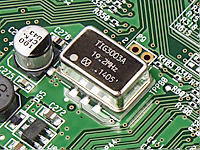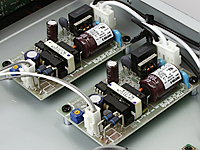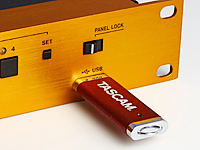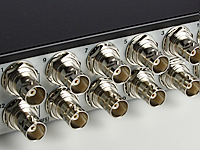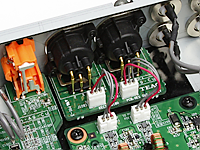Tascam CG-2000
The CG Series master clock generators are based on a high-precision crystal oscillator with jitter management and glitch-free relocking for ultra-high clock precision. The Tascam CG-2000 is designed for the needs of broadcasting and post production.
The crystal oscillator is the heart of the clock generator. In each model of the CG Series, an OCXO (oven-controlled crystal oscillator) is used for its high precision, and the fact it is not influenced by the temperature of the environment. Boasting a clock frequency precision of 0.01 ppm*1, which exceeds that of a TCXO (temperature-compensated crystal oscillator), these units are key in the creation of high-precision synchronization systems with word output frequency stability of ±0.005 ppm or less per day. Each model is equipped with an input connector that supports a 10-MHz signal. This allows it to be connected to a rubidium clock or GPS clock for even higher precision.
External clock jitter is reduced using an original Tascam circuit design that incorporates a high-performance video clock generator engineered with a FPGA*2 and a PLL (phase-locked loop) circuit with a discrete filter. This enables a stable clock signal to be provided to the video/word outputs for improved system stability. The glitch-free relock circuit prevents noise and skipping sounds caused by master clock dropouts.
In addition to twelve word clock outputs and four video outputs (CG-2000 and CG-1800 only), the digital outputs include two AES3/AES11 and two S/PDIF outputs, making the units useful for large-scale audio/video synchronization systems, and a wide variety of other applications. Of the twelve word outputs, two also support x2Fs, x4Fs and 256Fs output for use in systems with ProTools and other DAW software.
The CG Series has multiple functions to support maintenance, and the identification of issues if problems occur. The analyzer function measures output device termination, input level measurement (both for CG-2000 and CG-1800 only), and the measurement of input frequencies. These built-in features enable the devices to provide troubleshooting support. Additionally, a logging function allows issues to be listed, and saved to a CSV file format on a USB flash drive. Since crystal oscillators change over time, regular calibration is necessary. In order to avoid possible sync problems, timely inspections along with regular maintenance is required. For this purpose, the CG Series has a self-calibration function, enabling users to conduct maintenance using an external input signal*3 and simple operations.
Amphenol BNC connectors on the chassis use nuts for coupling, making them very durable. Also, a single circuit board is used for each connector providing excellent resistance to the twisting and pulling of cables, and the suppression of interference between connectors.
The CG Series is the latest in the line of innovative Tascam professional digital products – engineered with the latest digital clocking technology.
*1 Factory default value
*2 FPGA (Field Programmable Gate Array)
*3 Use of the self-calibration function requires preparation of a separate PPS-output 10MHz oscillator with a built-in GPS antenna.
High-precision synchronization systems can be created
Internal clock uses a high-precision OCXO that is not influenced by the temperature of the environment
The crystal oscillator is the heart of the clock generator. In the CG series, an OCXO (oven-controlled crystal oscillator) is used for its high precision, and the fact it is not influenced by the temperature of the environment. Boasting a clock frequency precision of 0.01 ppm (factory default value), which exceeds that of a TCXO (temperature-compensated crystal oscillator), this unit is key in the creation of high-precision synchronization systems – with word output frequency stability of ±0.005 ppm or less per day.
Input connector that supports 10 MHz signal – allowing the creation of systems with even higher precision
An input connector that supports an external 10 MHz signal enables the CG series to be connected to a rubidium clock or GPS clock for even higher precision.
Designed for high reliability and dependable stability
Power supply redundancy with two power supply circuits
With two power supply circuits, the CG-2000 features redundancy to prevent mishaps caused by power outages.
Redundant video reference/word clock input
With two inputs each for video reference (for CG-2000 and CG-1800) and world clock signals, there is redundancy to prevent problems due to external clock interruption.
Jitter management circuit provides stable clock
External clock jitter is reduced using an original TASCAM circuit design that incorporates a high-performance video clock generator device, featuring an FPGA (Field Programmable Gate Array) and a PLL (phase-locked loop) circuit with a discrete filter. This enables a stable clock signal to be provided to the video/word outputs, improving system stability.
Glitch-free relocking circuit prevents noise and skipping during clock dropouts and recovery
The CG series constantly measures the external reference clock. In devices that do not have built-in countermeasures, and the master clock signal drops out, the video reference and word clock signals could become out of phase, and sound might skip during the dropout – and again during recovery. In each CG model, if the clock drops out, a substitute reference clock signal is maintained with a high-performance holdover. During this time, the video reference and word clock signals are kept in-phase, so restoration of synchronization to the reference signal can occur without glitches, preventing video/audio noise and skipping sounds when recovering from a dropout.
Abundant input and output connectors
Numerous output connectors, including 12 word clock outputs
In addition to twelve word clock outputs and four video outputs (for CG-2000 and CG-1800), the digital outputs include two AES3/AES11 and two S/PDIF outputs, making this unit useful for large-scale audio/video synchronization systems, and a wide variety of other applications. Of the twelve word outputs, two also support x2Fs, x4Fs and 256Fs output - enabling them to be used in systems with ProTools and other DAW software.
A variety of video signal formats supported (for CG-2000 and CG-1800)
Analog NTSC/PAL and digital HD Tri-level video signal formats are supported.
Support for maintenance and identification of issues if problems occur
Analyzer function that can measure output device termination
In the installation of broadcasting and large-scale post-production studios, numerous connected devices and complicated wiring are common. The CG-2000 has an analyzer function that allows it to measure phase difference, input frequencies, input levels and the terminations of output devices - enabling it to provide support when troubleshooting problems should they occur.
Optimal levels can be provided to other devices by adjusting wordclock output
Depending on the routing of wiring and the receiving devices, signal levels could be reduced – resulting in proper reception failures. Since the output of the CG series can be set to multiple levels, it can provide optimal signal levels to connected devices.
Checking conditions if problems occur is possible through logging and GPO parallel output
One function that enables identification of the causes of trouble is the logging function. In addition to being able to check the log on the CG-2000 display, you can also capture the log as a CSV-format file on a USB flash drive. Moreover, you can also monitor the conditions of trouble occurrence by using GPO parallel output.
Self-calibration function enables maintenance by users
Since crystal oscillators change over time, regular calibration is necessary. In order to avoid problems that could lead to broadcast trouble, timely inspections and regular maintenance are required. The CG-2000 has a self-correction function, enabling users to conduct maintenance using external signal input* and simple operations. (*Use of the self-calibration function requires preparation of a separate PPS-output 10MHz oscillator with a built-in GPS antenna.)
Designed for durability
Durable nut-coupling Amphenol BNC connectors
Since the Amphenol BNC connectors use nuts for coupling, they are extremely resistant to pulling, twisting and multiple connect-disconnect cycles.
Independent circuit boards
Each connector has an independent circuit board. This provides excellent resistance to the twisting and pulling of cables and suppresses interference between connectors.
Features at a glance
- A series of highly reliable, highly stable and highly accurate master clock generators
- CG-2000 – the ultimate solution for broadcast and postproduction studios with the same features as CG-1800, plus:
- Highest reliability through redundant power supply and redundant video sync and wordclock inputs
- GPO signaling outputs for monitoring the error status
*Use of the self-calibration function requires preparation of a separate PPS-output or 10-MHz oscillator with a built-in GPS antenna
Specifications
| Inputs and outputs | ||
|---|---|---|
| VIDEO INPUT (except CG-1000) | BNC connector | |
| Input level | 0.5–2.0 Vp-p | |
| Input impedance | 75 Ω (can turn ON/OFF in menu) | |
| Input format | SD video black burst: NTSC (RS-170A), PAL (ITU-R624) SD video composite sync: NTSC B/W (RS-170) HD video tri-level: 720p/50/59.94/60 (SMPTE 296M) 1080p/23.976/24/25/29.97/30/50/59.94/60 (SMPTE 274M) 1080i/23.976/24/25/29.97/30 (SMPTE 274M) 1080PsF/23.976/24/25/29.97/30 (SMPTE RP211) |
|
| Permitted frequency deviation | ±10 ppm | |
| WORD/EXT INPUTS | BNC connector | |
| Input level | 0.5–5.0 Vp-p | |
| Input impedance | 75/50 Ω (can set to 75/50/OFF in menu) | |
| Supported frequencies | WORD CLOCK: 32/44.1/48/88.2/96/176.4/192 kHz (−4/−0.1/0.0/+0.1/+4% PULL UP/DOWN supported only when 48/96/192 kHz selected) ATOM: 10.0 MHz GPS: 10.0 MHz |
|
| Permitted frequency deviation | ±10 ppm | |
| AES3/11 INPUT | XLR-3-31 (1: GND, 2: HOT, 3: COLD) | |
| Input level | 0.2–10 Vp-p | |
| Input impedance | 110 Ω | |
| Format | AES11-2003, AES3-2003, IEC60958-4 | |
| Supported frequencies | 32/44.1/48/88.2/96/176.4/192 kHz (−4/−0.1/0.0/+0.1/+4% PULL UP/DOWN supported only when 48/96/192 kHz selected) |
|
| Permitted frequency deviation | ±10 ppm | |
| CALIBRATION INPUT | BNC connector | |
| Input level | 0.5–5.0 Vp-p | |
| Input impedance | 50 Ω (can turn ON/OFF in menu) | |
| Supported frequencies | ATOM: 10.0 MHz GPS: 10.0 MHz, PPS |
|
| VIDEO OUTPUTS (except CG-1000) | BNC connector | |
| Output impedance | 75 Ω | |
| Output format | SD video black burst: NTSC (RS-170A), PAL (ITU-R624) SD video composite sync: NTSC B/W (RS-170) HD video tri-level: 720p/50/59.94/60 (SMPTE 296M) 1080p/23.976/24/25/29.97/30/50/59.94/60 (SMPTE 274M) 1080i/23.976/24/25/29.97/30 (SMPTE 274M) 1080PsF/23.976/24/25/29.97/30 (SMPTE RP211) |
|
| WORD OUTPUTS | BNC connector | |
| Output level | 1.0–3.5Vp-p (can set by 0.5V steps in menu) | |
| Output impedance | 75 Ω | |
| Supported frequencies | 32/44.1/48/88.2/96/176.4/192 kHz 11.2896/12.288 MHz (Super Clock, only connectors 11/12) (−4/−0.1/0.0/+0.1/+4% PULL UP/DOWN supported only when 48/96/192 kHz selected) |
|
| AES3/11 OUTPUTS | XLR-3-32 (1: GND, 2: HOT, 3: COLD) | |
| Output level | 2.5 Vp-p | |
| Output impedance | 110 Ω | |
| Format | AES11-2003, AES3-2003, IEC60958-4 | |
| Supported frequencies | 32/44.1/48/88.2/96/176.4/192 kHz | |
| S/PDIF OUTPUTS | RCA pin jack | |
| Output level | 0.5 Vpp | |
| Output impedance | 75 Ω | |
| Format | IEC 60958-3 (SPDIF) | |
| Supported frequencies | 32/44.1/48/88.2/96/176.4/192 kHz (−4/−0.1/0.0/+0.1/+4% PULL UP/DOWN supported only when 48/96/192 kHz selected) |
|
| ALARM OUTPUT (CG-2000 only) | 6-pin Euroblock connector | |
| Output format | Open collector | |
| Output impedance | 10 Ω | |
| Dielectric strength | 20 V | |
| Maximum output current | 50 mA | |
| Performance | ||
|---|---|---|
| Internal oscillator | OCXO (oven-controlled crystal oscillator) | |
| Permitted frequency deviation | ±0.01 ppm (Adjusted value when shipped new from the factory) | |
| Frequency temperature characteristics | ±0.05 ppm (0 to 40 ºC) | |
| Long-term frequency stability | ±0.005 ppm (daily) ±0.5 ppm (annually) |
|
| Power supply and other specifications | ||
|---|---|---|
| Power | 100–240 V | |
| Power consumption | CG-2000: 14 W CG-1800: 11.5 W CG-1000: 10 W |
|
| External dimensions (w × h × d) | 483 mm × 44 mm × 310mm | |
| Weight | CG-2000: 3.3 kg CG-1800: 3.2 kg CG-1000: 3.1 kg |
|
| Operating temperature range | 0–40 °C | |
Design and specifications subject to change without notice.
| Titel | Type | Størrelse | Download |
|---|---|---|---|
| CG-2000_OM.pdf | 924.95KB | Download |

